陈述句变一般疑问句练习题
(完整版)陈述句变一般疑问句练习
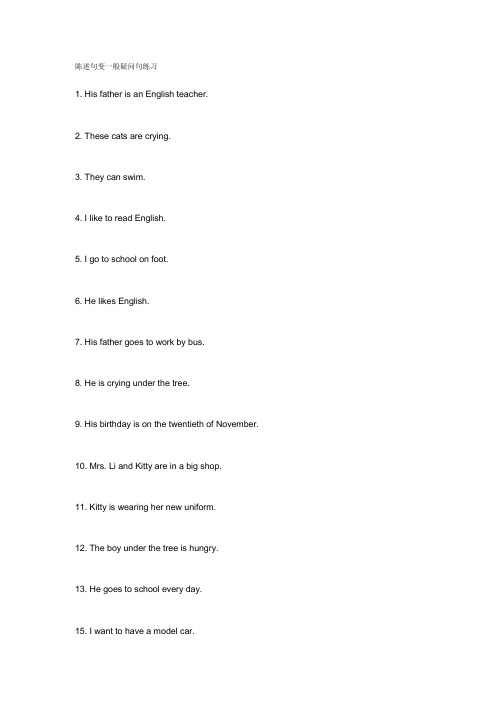
陈述句变一般疑问句练习1. His father is an English teacher.2. These cats are crying.3. They can swim.4. I like to read English.5. I go to school on foot.6. He likes English.7. His father goes to work by bus.8. He is crying under the tree.9. His birthday is on the twentieth of November.10. Mrs. Li and Kitty are in a big shop.11. Kitty is wearing her new uniform.12. The boy under the tree is hungry.13. He goes to school every day.15. I want to have a model car.16. She wants a cup of coffee.17. Mrs. Li and Kitty watch television at night.18. I do my homework after school将下列句子改成一般疑问句:1. It is a lovely dog.________________________________________2. She is lovely girl.________________________________________3. He is my father._________________________________________4. They are Lily’s cousins. ___________________________________5. We are classmates. ______________________________________6. I am a doctor. ________________________________________7. There is a bird in the tree. ________________________________8. There are many stars in the sky. ____________________________9. They are good friends. ____________________________________10. I love my parents. _______________________________________11. I play computer games every night. _________________________12. There are many books on the shelf. __________________________13. There is an ostrich in the zoo. _______________________________14. We have a pleasant home. __________________________________15. We like to climb the mountain. ______________________________16. They go to church on Sunday. ______________________________17. They walk to school every morning. __________________________18. It is a beautiful park. ______________________________19. It is a big map. ______________________________20. You are a singer. ______________________________用do does be 填空1> _____ she know all the answers ?Yes , she ____ . No, she _____.2> _____ the twins often fight ?Yes ,_____ do. No, _____ don’t.3> _____ your dad like listening to music?Yes ,____ does . No, _____ doesn’t.4>_____ uncle Tom wash his car everyday?Yes , ____ does . No, ____ doesn’t.5> _____ you have a new teacher?Yes , I ______. No, I ______.6>_____ she a teacher?Yes, she _____ . No, she _____.7> ______ you playing ball now?Yes, I ______. No, I ______.8> ______ the pig like to sleep?Yes, it ______. No, it _____.9> ______ five birds flying in the sky?Yes, they _____ .No, ____ aren’t.10> _____ your father smoking in the living room?Yes, ____ is .No, he _____.。
陈述句变一般疑问句练习
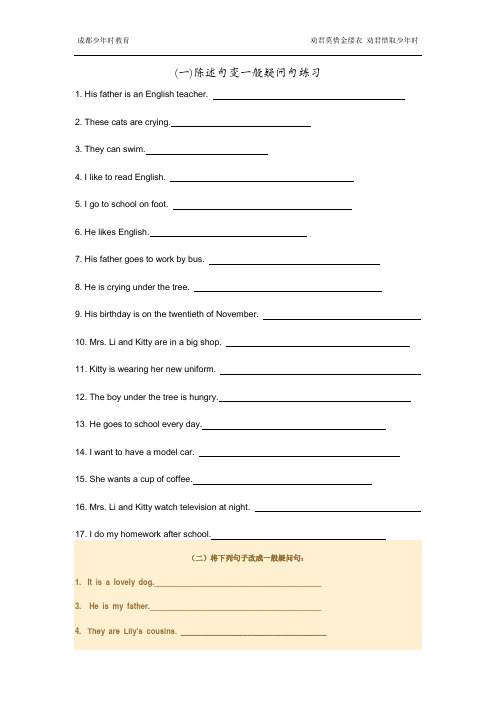
(一)陈述句变一般疑问句练习1. His father is an English teacher.2. These cats are crying.3. They can swim.4. I like to read English.5. I go to school on foot.6. He likes English.7. His father goes to work by bus.8. He is crying under the tree.9. His birthday is on the twentieth of November.10. Mrs. Li and Kitty are in a big shop.11. Kitty is wearing her new uniform.12. The boy under the tree is hungry.13. He goes to school every day.14. I want to have a model car.15. She wants a cup of coffee.16. Mrs. Li and Kitty watch television at night.17. I do my homework after school.(二)将下列句子改成一般疑问句:1. It is a lovely dog.________________________________________3. He is my father._________________________________________4. They are Lily’s cousins. ___________________________________5. We are classmates. ______________________________________6. I am a doctor. ________________________________________7. There is a bird in the tree. ________________________________8. There are many stars in the sky. ____________________________9. They are good friends. ____________________________________10. I love my parents. _______________________________________11. I play computer games every night. _________________________12. There are many books on the shelf. __________________________13. There is an ostrich in the zoo. _______________________________14. We have a pleasant home. __________________________________(三)用do does be 填空1> _____ she know all the answers ? Yes , she ____ . No, she _____.2> _____ the twins often fight ? Yes ,_____ do. No, _____ don’t.3> _____ your dad like listening to music?Yes ,____ does . No, _____ doesn’t.4>_____ uncle Tom wash his car everyday?Yes , ____ does . No, ____ doesn’t.5> _____ you have a new teacher? Yes , I ______. No, I ______.6>_____ she a teacher? Yes, she _____ . No, she _____.7> ______ you playing ball now? Yes, I ______. No, I ______.8> ______ the pig like to sleep? Yes, it ______. No, it _____.9> ______ five birds flying in the sky? Yes, they _____ .No, ____ aren’t.10> _____ your father smoking in the living room? Yes, ____ is .No, he _____.。
陈述句变一般疑问句练习题

陈述句变一般疑问句练习题导读:【一】1. His father is an English teacher.2. These cats are crying.3. They can swim.4. I like to read English.5. I go to school on foot.6. He likes English.7. His father goes to work by bus.8. He is crying under the tree.9. His birthday is on the twentieth of November.10. Mrs. Li and Kitty are in a big shop.11. Kitty is wearing her new uniform.12. The boy under the tree is hungry.13. He goes to school every day.15. I want to have a model car.16. She wants a cup of coffee.17. Mrs. Li and Kitty watch television at night.18. I do my homework after school.【二】1. Everybody is in the classroom.2. The boy does some housework at home.3. The children had a good time in the park.4. Jim has some story-books.5. Mr. Hunt told us something important at the meeting.6. The old man does morning exercises every morning.7. We are from China.8. I must finish my homework before eight o’clock.9. He often goes to the library on Sundays.【陈述句变一般疑问句练习题】1.陈述句改拟人句练习题2.疑问句的类型及特点3.老爸变!变!变!作文4.反问句改陈述句大全5.陈述句改成的拟人句6.反问句改陈述句的方法7.陈述句改为反问句的方法8.反问句改陈述句练习大全上文是关于陈述句变一般疑问句练习题,感谢您的阅读,希望对您有帮助,谢谢。
小学四年级陈述句变一般疑问句(包含练习及答案)
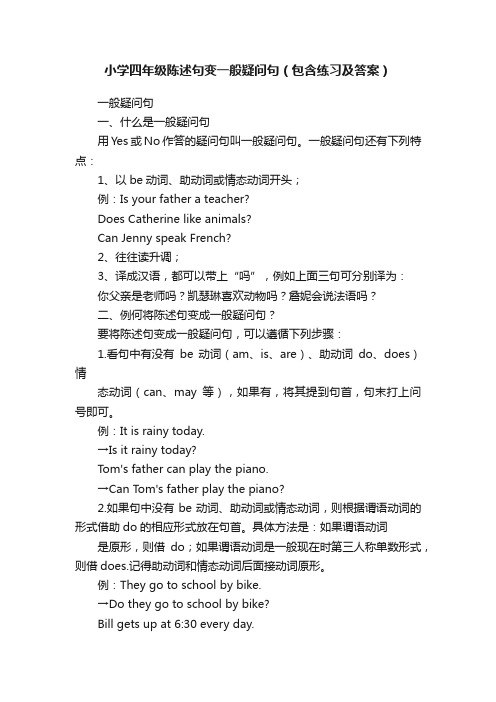
小学四年级陈述句变一般疑问句(包含练习及答案)一般疑问句一、什么是一般疑问句用Yes或No作答的疑问句叫一般疑问句。
一般疑问句还有下列特点:1、以be动词、助动词或情态动词开头;例:Is your father a teacher?Does Catherine like animals?Can Jenny speak French?2、往往读升调;3、译成汉语,都可以带上“吗”,例如上面三句可分别译为:你父亲是老师吗?凯瑟琳喜欢动物吗?詹妮会说法语吗?二、例何将陈述句变成一般疑问句?要将陈述句变成一般疑问句,可以遵循下列步骤:1.看句中有没有be动词(am、is、are)、助动词do、does)情态动词(can、may等),如果有,将其提到句首,句末打上问号即可。
例:It is rainy today.→Is it rainy today?Tom's father can play the piano.→Can Tom's father play the piano?2.如果句中没有be动词、助动词或情态动词,则根据谓语动词的形式借助do的相应形式放在句首。
具体方法是:如果谓语动词是原形,则借do;如果谓语动词是一般现在时第三人称单数形式,则借does.记得助动词和情态动词后面接动词原形。
例:They go to school by bike.→Do they go to school by bike?Bill gets up at 6:30 every day.→Does bill get up at 6:30 every day?三.陈述句变一般疑问句应注意的事项陈述句变成一般疑问句除了遵循上述规则以外,还应注意下列几点:1.如果陈述句中有第一人称,则变问句时最好要变为第二人称。
例:I usually have lunch at school.→Do you usually have lunch at school?My father is playing soccer.→Is your father playing soccer?2.如果陈述句中有some, 则变问句时往往要变成any 。
小学四年级陈述句变一般疑问句(包含练习及答案)
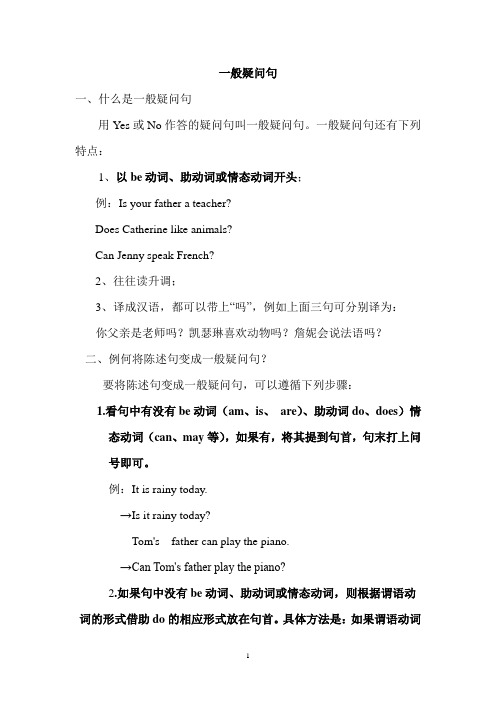
一般疑问句一、什么是一般疑问句用Yes或No作答的疑问句叫一般疑问句。
一般疑问句还有下列特点:1、以be动词、助动词或情态动词开头;例:Is your father a teacher?Does Catherine like animals?Can Jenny speak French?2、往往读升调;3、译成汉语,都可以带上“吗”,例如上面三句可分别译为:你父亲是老师吗?凯瑟琳喜欢动物吗?詹妮会说法语吗?二、例何将陈述句变成一般疑问句?要将陈述句变成一般疑问句,可以遵循下列步骤:1.看句中有没有be动词(am、is、are)、助动词do、does)情态动词(can、may等),如果有,将其提到句首,句末打上问号即可。
例:It is rainy today.→Is it rainy today?Tom's father can play the piano.→Can Tom's father play the piano?2.如果句中没有be动词、助动词或情态动词,则根据谓语动词的形式借助do的相应形式放在句首。
具体方法是:如果谓语动词是原形,则借do;如果谓语动词是一般现在时第三人称单数形式,则借does.记得助动词和情态动词后面接动词原形。
例:They go to school by bike.→Do they go to school by bike?Bill gets up at 6:30 every day.→Does bill get up at 6:30 every day?三.陈述句变一般疑问句应注意的事项陈述句变成一般疑问句除了遵循上述规则以外,还应注意下列几点:1.如果陈述句中有第一人称,则变问句时最好要变为第二人称。
例:I usually have lunch at school.→Do you usually have lunch at school?My father is playing soccer.→Is your father playing soccer?2.如果陈述句中有some, 则变问句时往往要变成any 。
陈述句变成一般疑问句及否定句练习题

陈述句变成一般疑问句及否定句练习题1.I am XXX.XXX?2.Mike is a student.Is Mike a student?3.Sarah can clean the classroom.Can Sarah clean the classroom?4.They are in the zoo.Are they in the zoo?5.There are some flowers in the vase.Are there some flowers in the vase?6.This is my sister.Is this your sister?7.XXX.Are you sweeping the floor?8.We need some masks.Do we need some masks?9.They like making the puppet.Do they like making the puppet?10.Su Hai and Su Yang live in a new house. Do Su Hai and Su Yang live in a new house?11.I put a book on my head.Did you put a book on your head?12.They sing "In the classroom" XXX.Do they sing "In the classroom" XXX?13.We play XXX.Do you play basketball on Sundays?14.XXX.Does Tom XXX?15.XXX.XXX XXX.16.XXX.XXX's ears are very long and can help them hear from far away.17.We like birds.Birds are one of our XXX.18.Hello。
陈述句变疑问句练习

一、陈述句→一般疑问句(一)更正区域:1.I am an outgoing boy.2.She is talking to her friends happily.3.Jack can jump really high.4.They need to make the kite fly more easily.5.We shall meet at 8:00 tomorrow morning.6.Everyone should pay a part in protecting the environment.7.Linda didn’t do her homework yesterday.8.My dad has gone to Shanghai on business.9.She used to dance in the morning every day.10.John hadn’t worked in the school since he retired.11.You should drink some hot tea with honey.更正区域:2.It sound like you have a fever.3.He played computer games all the weekend.4.That’s probably why.5.You need to take breaks away from the computer.6.Her head and neck still hurt yesterday.7.People often don’t help others because they don’t want any trouble.8.The man was saved by the doctors in time.9.Some passengers helped Mr. Wang to move the man onto thebus.10.Wang ping expects most or all of the passengers to get off.21.I am an outgoing boy.一般疑问句:更正区域:特殊疑问句:2.She is talking to her friends happily.一般疑问句:特殊疑问句:3.Jack can jump really high.一般疑问句:特殊疑问句:4.They need to make the kite fly more easily.一般疑问句:特殊疑问句:5.We shall meet at 8:00 tomorrow morning.一般疑问句:特殊疑问句:6.Everyone should pay a part in protecting the environment.一般疑问句:特殊疑问句:7.Linda didn’t do her homework yesterday.一般疑问句:特殊疑问句:8.My dad has gone to Shanghai on business.一般疑问句:特殊疑问句:9.She used to dance in the morning every day.一般疑问句:特殊疑问句:10.John hadn’t worked in the school since he retired.一般疑问句:特殊疑问句:34二、陈述句碱→特殊疑问句(二)11. You should drink some hot tea with honey.一般疑问句: 特殊疑问句: 12. It sound like you have a fever.一般疑问句: 特殊疑问句: 13. He played computer games all the weekend.一般疑问句: 特殊疑问句: 14. That’s probably why.一般疑问句: 特殊疑问句: 15. You need to take breaks away from the computer.一般疑问句: 特殊疑问句: 16. Her head and neck still hurt yesterday.一般疑问句: 特殊疑问句:17. People often don’t help others because they don’t want any trouble.一般疑问句: 特殊疑问句: 18. The man was saved by the doctors in time.一般疑问句: 特殊疑问句:19. Some passengers helped Mr. Wang to move the man onto the bus.一般疑问句: 特殊疑问句: 20. Wang ping expects most or all of the passengers to get off.一般疑问句:特殊疑问句:更正区域:5。
如何将陈述句改为一般疑问句

如何将陈述句改为一般疑问句(练习题) 一、看句子里是否有be动词,am , is, are, 如果有be动词提前,句号改问号。
但是要注意,如果主语是I,或we, 变成一般疑问句时,要改为you.二、看句子里是否有情态动词:can , may , must, 如果有,把情态动词提前,句号改问号。
但是要注意,如果主语是I,或we, 变成一般疑问句时,要改为you.三,如果既没有be动词,也没有情态动词,那么在句子前加do, 或does,叫做助动词。
主语是单数第三人称加does,其他加do如果是过去式,那么助动词也要跟着用相应的过去式—did注意:一般疑问句做回答时,主语要改为人称代词:I, we,you, he, she ,it ,they.陈述句改为否定句一、看句子里是否有be动词,am , is, are, 如果有be动词,那么直接在be动词后加not就可以,过去式也适用。
二、看句子里是否有情态动词:can , may , must, 如果有,那么直接在情态动词后加not. 注意,如果情态动词是must ,则改为need以后再加not.三,如果既没有be动词,也没有情态动词,那么在主语后加do not, 或does not. 主语是单数第三人称加does not,原来句子里的动词单数第三形式改为原形。
如果是过去式,那么助动词也要跟着用相应的过去式—did not,句子里以前的动词过去式改为原形。
四,祈使句改为否定句,直接在句首加don’t @练习题把下列句子改为一般疑问句并作出回答和否定句。
1. It is a lovely dog.2. She is a lovely girl.3. He is his father.4. They are Lily’s cousins.5. We are classmates.6. I am a doctor.7. There is a bird in the tree.10. I love my parents.11. I play computer games every night.。
一般疑问句练习题

一般疑问句练习题一、基本结构类1. 将下列陈述句改为一般疑问句:a. He likes playing football.b. She is a teacher.c. They go to school bus.2. 将下列否定句改为一般疑问句:a. He doesn't have a pen.b. She isn't reading a book.c. They haven't finished their homework.二、be动词类1. 将下列句子改为一般疑问句:a. He is in the classroom.b. She is eating an apple.c. It is a sunny day.2. 用be动词的一般疑问句提问下列句子:a. The cat is on the table.b. We are students.c. They are watching a movie.三、情态动词类1. 将下列句子改为一般疑问句:a. He can speak English.b. She may go to the party.c. They must finish the task today.2. 用情态动词的一般疑问句提问下列句子:a. You should study hard.b. He might be late.c. We couldn't find the way.四、实义动词类1. 将下列句子改为一般疑问句:a. He plays basketball every day.b. She visited the museum last week.c. They will travel to Japan next month.2. 用实义动词的一般疑问句提问下列句子:a. You eat breakfast at 7:00.b. He has a meeting in the morning.c. They bought a new car.五、特殊疑问词类1. 用特殊疑问词提问下列句子:a. Where does she live?b. How old is he?2. 根据下列情景提问:a. 问天气:What's the weather like today?b. 问时间:What time do you get up?c. 问频率:How often do you exercise?六、反义疑问句类1. 完成下列反义疑问句:a. She isn't a doctor, is she?b. You have finished your homework, ____________?c. They didn't go to the movies last night,____________?2. 将下列句子改为反义疑问句:a. He can drive a car, ____________?c. You don't like coffee, ____________?七、选择疑问句类1. 完成下列选择疑问句:a. Is he a teacher or a doctor?b. Do you want tea or coffee, ____________?c. Will they go train or plane, ____________?2. 根据下列情景提出选择疑问句:a. 询问职业:Are you a student or a worker?c. 询问喜好:Does she like singing or dancing?八、复合句类1. 将下列复合句改为一般疑问句:a. If he has time, he will go to the library.b. Unless it rains, we will have a picnic.c. Because she was tired, she went to bed early.2. 用一般疑问句提问下列复合句:b. If you study hard, you will pass the exam.c. Unless you hurry up, you will be late.九、时态类1. 将下列句子改为一般疑问句,注意时态:a. He has finished his lunch.b. They were playing football yesterday.c. She will visit her grandparents next week.2. 用一般疑问句提问下列句子,注意时态:a. You have seen this movie before.b. He is reading a book in the library.c. They had left before I arrived.十、主谓一致类1. 将下列句子改为一般疑问句,注意主谓一致:a. The children are playing in the park.b. This information is very important.c. Either you or he is wrong.2. 用一般疑问句提问下列句子,注意主谓一致:a. One of the students has a question.b. The audience were very impressed the performance.c. Neither you nor he is responsible for this mistake.一、基本结构类1. 将下列陈述句改为一般疑问句:a. Does he like playing football?b. Is she a teacher?c. Do they go to school bus?2. 将下列否定句改为一般疑问句:a. Does he have a pen?b. Is she reading a book?c. Have they finished their homework?二、be动词类1. 将下列句子改为一般疑问句:a. Is he in the classroom?b. Is she eating an apple?c. Is it a sunny day?2. 用be动词的一般疑问句提问下列句子:a. Is the cat on the table?b. Are we students?c. Are they watching a movie?三、情态动词类1. 将下列句子改为一般疑问句:a. Can he speak English?b. May she go to the party?c. Must they finish the task today?2. 用情态动词的一般疑问句提问下列句子:a. Should you study hard?b. Might he be late?c. Could we find the way?四、实义动词类1. 将下列句子改为一般疑问句:a. Does he play basketball every day?b. Did she visit the museum last week?c. Will they travel to Japan next month?2. 用实义动词的一般疑问句提问下列句子:a. Do you eat breakfast at 7:00?b. Does he have a meeting in the morning?c. Did they buy a new car?五、特殊疑问词类1. 用特殊疑问词提问下列句子:a. Where does she live?b. How old is he?2. 根据下列情景提问:a. 问天气:What's the weather like today?b. 问时间:What time do you get up?c. 问频率:How often do you exercise?六、反义疑问句类1. 完成下列反义疑问句:a. She isn't a doctor, is she?b. You have finished your homework, haven't you?c. They didn't go to the movies last night, did they?2. 将下列句子改为反义疑问句:a. He can drive a car, can't he?c. You don't like coffee, do you?七、选择疑问句类1. 完成下列选择疑问句:a. Is he a teacher or a doctor?b. Do you want tea or coffee, tea or coffee?c. Will they go train or plane, train or plane?2. 根据下列情景提出选择疑问句:a. 询问职业:Are you a student or a worker?c. 询问喜好:Does she like singing or dancing?八、复合句类1. 将下列复合句改为一般疑问句:a. If he has time, will he go to the library?b. Unless it rains, will we have a picnic?c. Because she was tired, did she go to bed early?2. 用一般疑问句提问下列复合句:b. If you study hard, will you pass the exam?c. Unless you hurry up, will you be late?九、时态类1. 将下列句子改为一般疑问句,注意时态:a. Has he finished his lunch?b. Were they playing football yesterday?c. Will she visit her grandparents next week?2. 用一般疑问句提问下列句子,注意时态:a. Have you seen this movie before?b. Is he reading a book in the library?c. Had they left before I arrived?十、主谓一致类1. 将下列句子改为一般疑问句,注意主谓一致:a. Are the children playing in the park?b. Is this information very important?c. Is either you or he wrong?2. 用一般疑问句提问下列句子,注意主谓一致:a. Does one of the students have a question?b. Were the audience very impressed the performance?c. Is neither you nor he responsible for this mistake?。
最新陈述句变一般疑问句练习题14篇

陈述句变一般疑问句练习题14篇陈述句变一般疑问句练习题14篇陈述句变一般疑问句练习题(1)初中英语句型转换一、肯定句改否定句的方法——一步法1. 有be动词/情态动词:在be动词/情态动词后后加not。
2. 无be动词/情态动词,在动词前加don’t / doesn’t / didn’t。
3. 肯定句中的some 改成any。
4. Be动词 am, is , are . 情态动词:can,will,should,must,may。
练习~~~把下列句子变成否定句:1. I am listening to music._______________________________________2. Mike is a student. _______________________________________3. Sarah can clean the classroom._______________________________________4. They are in the zoo. _______________________________________5. There are some flowers in the vase._______________________________________6. This is my sister._______________________________________7. We are sweeping the floor.___________________________8. We need some masks. _________________________________9. They like making the puppet._________________________________10. Su Hai and Su Yang live in a newhouse.______________________________________________11. I put a book on my head._________________________________________________12. They sing “In the classroom” together._______________________________________________13. We play basketball on Sundays._________________________________________________14. Tom likes listening to music.____________________________________________15. We go to school on Sunday._________________________________________________16. His father works hard._________________________________________________17. Alice will go to the Summer Palace.____________________________________________18. You should study hard for yourself .__________________________________________二、肯定句改一般疑问句的方法——三步法1. 有be动词/情态动词:be动词/情态动词提到句首,其余照抄,(some改any,my改your)句末用问号。
陈述句变一般疑问句练习题
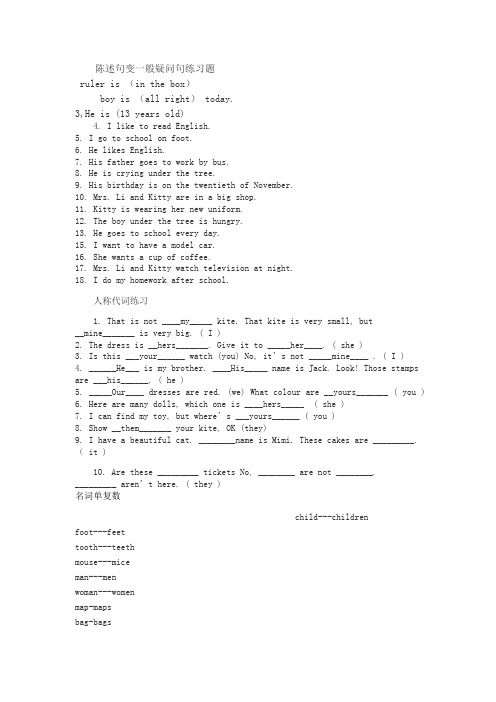
陈述句变一般疑问句练习题ruler is (in the box)boy is (all right) today.3,He is (13 years old)4. I like to read English.5. I go to school on foot.6. He likes English.7. His father goes to work by bus.8. He is crying under the tree.9. His birthday is on the twentieth of November.10. Mrs. Li and Kitty are in a big shop.11. Kitty is wearing her new uniform.12. The boy under the tree is hungry.13. He goes to school every day.15. I want to have a model car.16. She wants a cup of coffee.17. Mrs. Li and Kitty watch television at night.18. I do my homework after school.人称代词练习1. That is not ____my_____ kite. That kite is very small, but__mine_______ is very big. ( I )2. The dress is __hers_______. Give it to _____her____. ( she )3. Is this ___your______ watch (you) No, it’s not _____mine____ . ( I )4. ______He___ is my brother. ____His_____ name is Jack. Look! Those stamps are ___his______. ( he )5. _____Our____ dresses are red. (we) What colour are __yours_______ ( you )6. Here are many dolls, which one is ____hers_____ ( she )7. I can find my toy, but where’s ___yours______ ( you )8. Show __them_______ your kite, OK (they)9. I have a beautiful cat. ________name is Mimi. These cakes are _________. ( it )10. Are these _________ tickets No, ________ are not ________._________ aren’t here. ( they )名词单复数child---childrenfoot---feettooth---teethmouse---miceman---menwoman---womenmap-mapsbag-bags。
小学四年级陈述句变一般疑问句(包含练习及答案)

小学四年级陈述句变一般疑问句(包含练习及答案)一般疑问句是一种需要用Yes或No回答的疑问句。
它有以下特点:1.以be动词、助动词或情态动词开头,例如:Is your father a teacher。
Does Catherine like animals。
Can ___ speak French?2.往往读升调。
3.译成汉语时,可以带上“吗”。
要将陈述句变成一般疑问句,可以遵循以下步骤:1.查看句子中是否有be动词(am、is、are)、助动词do、does)或情态动词(can、may等),如果有,将其提到句首,句末加上问号即可。
例如:It is rainy today。
→ Is it rainy today。
Tom's father can play the piano。
→ Can Tom's father play the piano?2.如果句子中没有be动词、助动词或情态动词,则根据谓语动词的形式借助do的相应形式放在句首。
具体方法是:如果谓语动词是原形,则借do;如果谓语动词是一般现在时第三人称单数形式,则借does。
记得助动词和情态动词后面接动词原形。
例如:They go to school by bike。
→ Do they go to school by bike。
Bill gets up at 6:30 every day。
→ Does Bill get up at 6:30 every day?在将___变成一般疑问句时,还应注意以下几点:1.如果陈述句中有第一人称,则最好将其变为第二人称。
例如:I usually have lunch at school。
→ Do you usually have lunch at school。
My ___。
→ Is your father playing soccer?2.如果陈述句中有some,则变问句时往往要变成any。
小学四年级陈述句变一般疑问句(包含练习及答案)
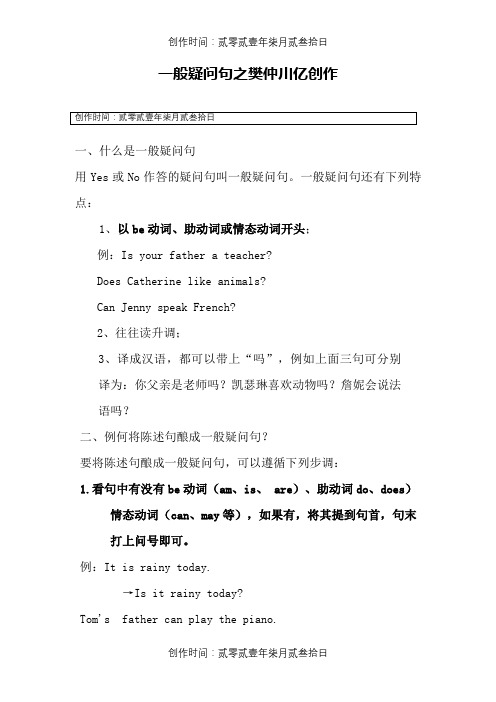
一般疑问句之樊仲川亿创作一、什么是一般疑问句用Yes或No作答的疑问句叫一般疑问句。
一般疑问句还有下列特点:1、以be动词、助动词或情态动词开头;例:Is your father a teacher?Does Catherine like animals?Can Jenny speak French?2、往往读升调;3、译成汉语,都可以带上“吗”,例如上面三句可分别译为:你父亲是老师吗?凯瑟琳喜欢动物吗?詹妮会说法语吗?二、例何将陈述句酿成一般疑问句?要将陈述句酿成一般疑问句,可以遵循下列步调:1.看句中有没有be动词(am、is、 are)、助动词do、does)情态动词(can、may等),如果有,将其提到句首,句末打上问号即可。
例:It is rainy today.→Is it rainy today?Tom's father can play the piano.→Can Tom's father play the piano?2.如果句中没有be动词、助动词或情态动词,则根据谓语动词的形式借助do的相应形式放在句首。
具体方法是:如果谓语动词是原形,则借do;如果谓语动词是一般现在时第三人称单数形式,则借does.记得助动词和情态动词后面接动词原形。
例:They go to school by bike.→Do they go to school by bike?Bill gets up at 6:30 every day.→Does bill get up at 6:30 every day?陈述句酿成一般疑问句除了遵循上述规则以外,还应注意下列几点:1.如果陈述句中有第一人称,则变问句时最好要变成第二人称。
例:I usually have lunch at school.→Do you usually have lunch at school?My father is playing soccer.→Is your father playing soccer?2.如果陈述句中有some, 则变问句时往往要酿成any 。
陈述句变一般疑问句
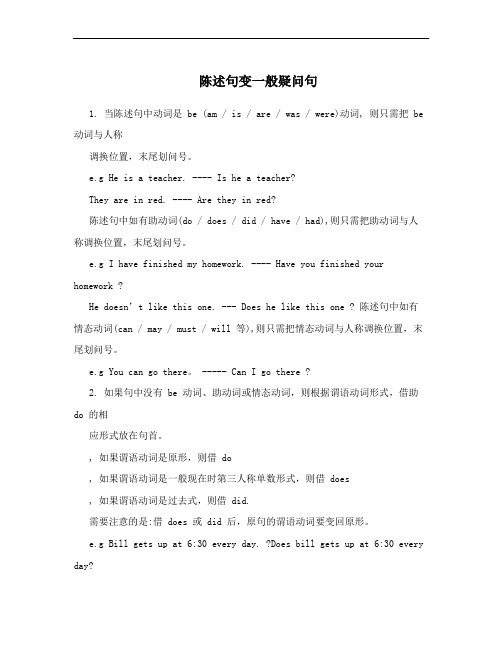
陈述句变一般疑问句1. 当陈述句中动词是 be (am / is / are / was / were)动词, 则只需把 be 动词与人称调换位置,末尾划问号。
e.g He is a teacher. ---- Is he a teacher?They are in red. ---- Are they in red?陈述句中如有助动词(do / does / did / have / had),则只需把助动词与人称调换位置,末尾划问号。
e.g I have finished my homework. ---- Have you finished your homework ?He doesn’t like this one. --- Does he like this one ? 陈述句中如有情态动词(can / may / must / will 等),则只需把情态动词与人称调换位置,末尾划问号。
e.g You can go there。
----- Can I go there ?2. 如果句中没有 be 动词、助动词或情态动词,则根据谓语动词形式,借助do 的相应形式放在句首。
, 如果谓语动词是原形,则借 do, 如果谓语动词是一般现在时第三人称单数形式,则借 does, 如果谓语动词是过去式,则借 did.需要注意的是:借 does 或 did 后,原句的谓语动词要变回原形。
e.g Bill gets up at 6:30 every day. ?Does bill gets up at 6:30 every day?The students saw a film yesterday. ?Did the students see a film yesterday?注意:陈述句变一般疑问句注意的事项:, 如果陈述句中有第一人称,则变问句时要变为第二人称。
e.g I usually have lunch at school. ? Do you usually have lunch at school?My father is playing soccer. ? Is your father playing soccer?, 如果陈述句中有some,则变问句时要变为 any。
- 1、下载文档前请自行甄别文档内容的完整性,平台不提供额外的编辑、内容补充、找答案等附加服务。
- 2、"仅部分预览"的文档,不可在线预览部分如存在完整性等问题,可反馈申请退款(可完整预览的文档不适用该条件!)。
- 3、如文档侵犯您的权益,请联系客服反馈,我们会尽快为您处理(人工客服工作时间:9:00-18:30)。
.
. 陈述句变一般疑问句练习题
1.His ruler is (in the box )
2.The boy is (all right ) today.
3,He is (13 years old)
4. I like to read English.
5. I go to school on foot.
6. He likes English.
7. His father goes to work by bus.
8. He is crying under the tree.
9. His birthday is on the twentieth of November. 10. Mrs. Li and Kitty are in a big shop. 11. Kitty is wearing her new uniform. 12. The boy under the tree is hungry. 13. He goes to school every day. 15. I want to have a model car. 16. She wants a cup of coffee. 17. Mrs. Li and Kitty watch television at night. 18. I do my homework after school.
人称代词练习
1. That is not ____my_____ kite. That kite is very small, but __mine_______ is very big. ( I )
2. The dress is __hers_______. Give it to _____her____. ( she )
3. Is this ___your______ watch? (you) No, it’s not _____mine____ . ( I )
4. ______He___ is my brother. ____His_____ name is Jack. Look! Those stamps are ___his______. ( he )
5. _____Our____ dresses are red. (we) What colour are __yours_______? ( you )
6. Here are many dolls, which one is ____hers_____ ? ( she )
7. I can find my toy, but where’s ___yours______? ( you )
8. Show __them_______ your kite, OK? (they)
9. I have a beautiful cat. ________name is Mimi. These cakes are _________. ( it )
10. Are these _________ tickets? No, ________ are not ________. _________ aren’t here. ( they )
名词单复数
child---children foot---feet tooth---teeth mouse---mice man---men woman---women map-maps bag-bags。
